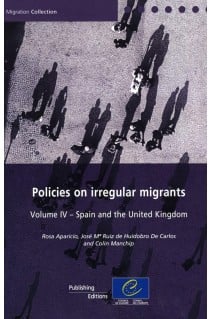



Irregular migrants, who by definition are in an unlawful situation, face insecurity on a daily basis. This prompted the Council of Europe's European Committee on Migration (CDMG) to assess the policy and practice in member states. The aim of the exercise was to identify and evaluate national experiences regarding regularisation proceedings and to draw up proposals for dealing with irregular migration and improving co-operation between countries of origin and host countries.Volumes I and II cover five countries that participated in the first series of evaluations: Armenia, Germany, Greece, Italy and the Russian Federation.Volume III and IV include reports prepared within the second series and cover five other countries: France, Poland, Portugal, Spain and the United Kingdom.
Spain - Combating the exploitation of irregular immigrant workers: the recognition of their rights and their access to social benefits
1. Executive summary
2. Introduction
3. Brief analysis of irregular immigration
4. Policy on combating the exploitation of irregular immigrant workers. Recognition of their rights and their access to social benefits: main characteristics
5. Evaluation of the policy
6. Summary of conclusions
7. References
8. Appendix
United Kingdom - Irregular migration: the case for and against formal regularisation programmes
1. Executive summary
2. Short analysis of illegal migration
3. Presentation of the main characteristics of the UK's policy
4. Implementation of the policy
5. Regularisation
6. The case for and against formal regularisation
7. Evaluation of the impact that new specific policies have on the irregular migration influx and irregular migrants
8. Summary of conclusions
9. Appendix - Meetings held
Download an extract (1000)

Irregular migrants, who by definition are in an unlawful situation, face insecurity on a daily basis. This prompted the Council of Europe's European Committee on Migration (CDMG) to assess the policy and practice in member states. The aim of the exercise was to identify and evaluate national experiences regarding regularisation proceedings and to draw up proposals for dealing with irregular migration and improving co-operation between countries of origin and host countries.Volumes I and II cover five countries that participated in the first series of evaluations: Armenia, Germany, Greece, Italy and the Russian Federation.Volume III and IV include reports prepared within the second series and cover five other countries: France, Poland, Portugal, Spain and the United Kingdom.
Please note that in accordance with our terms & conditions, PDF/epubs may only be purchased by private individuals.
